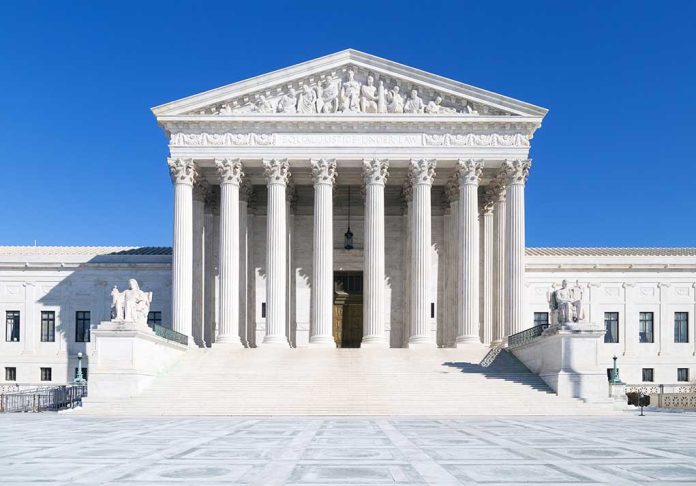
The Supreme Court has dealt a blow to Meta, allowing a multibillion-dollar class-action lawsuit to proceed against the tech giant over the Cambridge Analytica privacy scandal.
At a Glance
- Supreme Court upholds class-action lawsuit against Meta over Cambridge Analytica scandal
- Investors claim Meta failed to disclose risks of user data misuse
- Lawsuit stems from 2018 revelations of data breach affecting 87 million Facebook users
- Case focuses on Meta’s disclosure practices in SEC filings
- Meta has already paid billions in fines and settlements related to privacy issues
Supreme Court Allows Lawsuit to Proceed
In a significant development for tech industry accountability, the Supreme Court has dismissed Meta’s appeal, effectively allowing a class-action lawsuit against the company to move forward. The lawsuit, brought by investors, centers on the notorious Cambridge Analytica privacy scandal that rocked Facebook, now Meta, in 2018. This decision upholds a previous ruling by the U.S. Court of Appeals for the 9th Circuit, which sided with shareholders in their pursuit of legal action against the social media giant.
The case revolves around allegations that Meta failed to properly disclose the risks associated with the misuse of Facebook users’ personal data. Investors claim that this oversight led to a sharp decline in Meta’s stock value when the full extent of the Cambridge Analytica scandal came to light in 2018. The controversy erupted when it was revealed that the political consulting firm, linked to former Trump strategist Steve Bannon, had accessed data from approximately 87 million Facebook users to target voters during the 2016 U.S. presidential election.
Implications for Corporate Disclosure Practices
This lawsuit raises important questions about what publicly traded companies must disclose in the “risk factors” section of their Securities and Exchange Commission (SEC) filings. The core issue is whether Meta misled shareholders by presenting the risk of data misuse as hypothetical when, in fact, it had already occurred. The 9th Circuit Court’s decision, now left standing by the Supreme Court, suggests that companies may need to be more forthcoming about past adverse events in their risk disclosures.
Despite Meta’s assertion that the claims are without merit, the company now faces the prospect of a protracted legal battle. The tech giant has already incurred significant financial penalties related to privacy issues, including a $5.1 billion fine and a $725 million settlement. This latest development underscores the ongoing scrutiny of Big Tech’s data handling practices and the potential consequences of failing to meet transparency obligations.
The Cambridge Analytica Scandal Revisited
The origins of this legal challenge date back to 2015 when Cambridge Analytica first misused Facebook data to create voter profiles for political campaigns. At the time, Facebook’s stock price remained unaffected. However, when the full scope of the data breach was revealed in 2018, the company’s market value plummeted, prompting investor outrage and legal action.
“The Supreme Court stated that they are allowing the multibillion-dollar class action investors’ lawsuit to proceed against Facebook parent Meta, stemming from the privacy scandal involving the Cambridge Analytica political consulting firm.”
The lawsuit accuses Facebook of misleading shareholders in its 2016 risk disclosures by presenting data misuse as a hypothetical risk when the company was already aware of the Cambridge Analytica breach. This case highlights the delicate balance companies must strike between protecting their interests and providing transparent, accurate information to investors.
Looking Ahead
As the case returns to the lower courts, it will be closely watched by both the tech industry and the investment community. The outcome could set important precedents for how companies disclose past and potential risks in their SEC filings. For Meta, this represents another chapter in its ongoing struggle to rebuild trust and navigate the complex landscape of data privacy and corporate responsibility in the digital age.
The Supreme Court’s decision to allow this lawsuit to proceed serves as a reminder of the high stakes involved in data privacy and corporate transparency. As technology continues to evolve and shape our society, the legal and ethical frameworks governing its use will undoubtedly face further challenges and scrutiny.
Sources:
U.S. Supreme Court allows multibillion-dollar class action to proceed against Meta
Supreme Court allows multibillion-dollar class action to proceed against Meta














